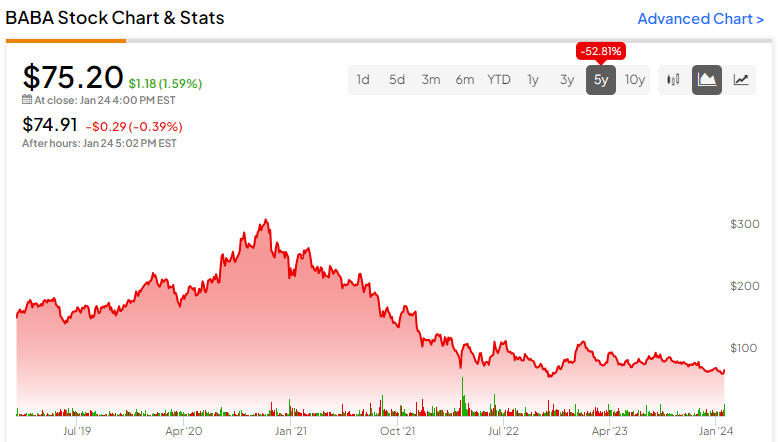If any Wall Street-listed company demonstrates the ebbs and flows of China’s economic landscape, it would unquestionably be Alibaba (NYSE:BABA). The decision to load up on Alibaba shares may seem tempting, especially if one holds an optimistic view of China’s imminent economic resurgence. While holding a long-term bullish view on BABA stock, it’s crucial to exercise caution given an impending watershed event.
Alibaba’s Resonance with American Counterpart
Alibaba functions as the Chinese equivalent of America’s Amazon (NASDAQ:AMZN). Mirroring Amazon’s success in the U.S., Alibaba dominates the e-commerce arena in China and excels in various market segments beyond e-commerce.
The Temptation of Alibaba’s Valuation
Should one take stock in Barclays’ proclamation that Alibaba stock is “too cheap to ignore”? The label of “cheap” undeniably holds weight. While American tech stocks soared, BABA stock struggled. Therefore, an investment in Alibaba aligns with the classic adage of buying low and selling high. Traditional valuation metrics support this stance, with Alibaba’s GAAP trailing 12-month P/E ratio of 10.6x proving more appealing than the sector median P/E ratio of 17.51x.
In backing this belief, Barclays analyst Jiong Shao emphasizes Alibaba’s $27 billion in free cash flow generated over the last 12 months, deeming it “among the most compelling.” Shao further touts BABA stock as “the cheapest major tech stock globally,” affirming an Overweight rating.
Adding to this, news of significant insider buying emerges, with reports of Alibaba co-founder Jack Ma purchasing $50 million worth of company shares. Furthermore, Alibaba Chairman procured $151 million worth of BABA stock shares in the previous quarter, signaling confidence from insiders intimately acquainted with the company.
Market Excitement and Cautionary Measures
While there is a palpable fervor surrounding Chinese tech-related stocks, exercising restraint before investing in Alibaba at this juncture could prove prudent. Market excitement extends beyond Alibaba to encompass Chinese businesses at large, spurred by China’s central bank infusing $139 billion in long-term liquidity into the economy by reducing the cash reserve ratio for banks. With plans for a substantial $278 billion rescue package, traders fervently seized shares of Alibaba and other China-associated tech stocks.
Nevertheless, it may be premature to declare victory and anticipate a sustained upswing in Chinese stocks. Historical context reminds us of the limitations of government intervention, notably when Chinese authorities curbed short selling to stabilize the nation’s stock market, an approach that faltered in the long run. While the Federal Reserve’s liquidity injections historically buoyed the U.S. stock market, the efficacy of analogous measures in China remains to be seen, with potential reverberations for Alibaba.
With Alibaba’s pivotal earnings report due on January 31, the stakes are notably elevated. Anticipation looms as Wall Street eyes an expected EPS of $2.73 for the third quarter of Fiscal Year 2024, surpassing any quarterly EPS forecast in recent memory for Alibaba. The prospect of a major letdown is tangible.
Analyst Appraisal and Contemplation
Alibaba emerges as a Strong Buy on TipRanks, backed by 18 Buy ratings and two Holds proffered by analysts in the last three months. The average Alibaba stock price target of $118.60 implies significant upside potential.
Enquiring about the most profitable analyst on a one-year timeframe covering BABA stock leads to Rob Sanderson of Loop Capital Markets, touting an average return of 11.74% per rating and a 52% success rate.
Final Consideration on Alibaba’s Stock
Amid a long-term bullish view on Alibaba’s growth prospects, the prevailing uncertainty regarding China’s intervention and Alibaba’s impending earnings results signals prudence in delaying a position in BABA stock. While Alibaba could stage a potential resurgence in 2024, the current juncture calls for restraint.

